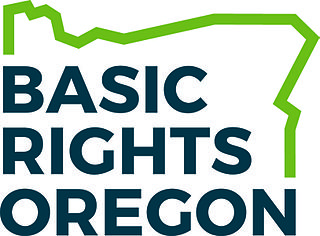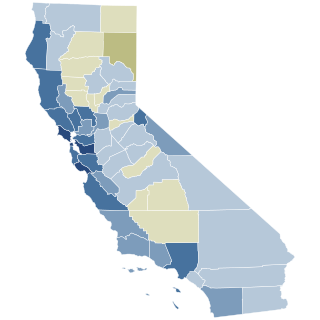
Informed consent is a principle in medical ethics, medical law and media studies, that a patient must have sufficient information and understanding before making decisions about their medical care. Pertinent information may include risks and benefits of treatments, alternative treatments, the patient's role in treatment, and their right to refuse treatment. In most systems, healthcare providers have a legal and ethical responsibility to ensure that a patient's consent is informed. This principle applies more broadly than healthcare intervention, for example to conduct research and to disclose a person's medical information.

The California special election of 2005 was held on November 8, 2005 after being called by Governor Arnold Schwarzenegger on June 13, 2005.

Basic Rights Oregon is an American nonprofit LGBT rights organization based in Portland, Oregon. It is the largest advocacy, education, and political organization working in Oregon to end discrimination based on sexual orientation and gender identity. Basic Rights Oregon has a full-time staff, a contract lobbyist, and more than 10,000 contributors, and 5,000 volunteers. It is a 501(c)(4) organization that maintains a 501(c)(3) education fund, a state candidate PAC and a ballot measure PAC. The organization is a member of the Equality Federation.

Proposition 73, the Parental Notification Initiative, would have amended the California Constitution to bar abortion on an unemancipated minor until 48 hours after physician notifies minor's parent/legal guardian, except in medical emergency or with parental waiver. The amendment permitted a judicial waiver of notice based on clear and convincing evidence of the minor's maturity or best interests. The minor's physician must report abortions performed on minors and State shall compile statistics. The amendment authorized monetary damages for violation. The minor must consent to abortion unless mentally incapable or in medical emergency. Permits judicial relief if minor's consent to abortion is coerced.
H. L. v. Matheson, 450 U.S. 398 (1981), was a United States Supreme Court abortion rights case, according to which a state may require a doctor to inform a teenaged girl's parents before performing an abortion or face criminal penalty.
Many jurisdictions have laws applying to minors and abortion. These parental involvement laws require that one or more parents consent or be informed before their minor daughter may legally have an abortion.

Bernard John "Ben" Westlund II was an American politician in the U.S. state of Oregon. A Democrat, he was elected State Treasurer in 2008. Previously, Westlund served in both houses of the Oregon Legislative Assembly, as a Republican from 1996 to 2006, as an independent from 2006 to 2007, and then as a Democrat. Westlund dropped his Republican party affiliation to run for Governor of Oregon in the 2006 election, but dropped out of the race in August. In December 2006 he became a Democrat. Westlund worked as a business analyst, and ran businesses in mining, ranching, and agriculture.

California Proposition 85, the Parental Notification Initiative, was a proposition on the ballot for California voters in the general election of November 7, 2006. It was similar to the previous year's Proposition 73. It failed by a vote of 46%-54%.
This is a timeline of reproductive rights legislation, a chronological list of laws and legal decisions affecting human reproductive rights. Reproductive rights are a sub-set of human rights pertaining to issues of reproduction and reproductive health. These rights may include some or all of the following: the right to legal or safe abortion, the right to birth control, the right to access quality reproductive healthcare, and the right to education and access in order to make reproductive choices free from coercion, discrimination, and violence. Reproductive rights may also include the right to receive education about contraception and sexually transmitted infections, and freedom from coerced sterilization, abortion, and contraception, and protection from practices such as female genital mutilation (FGM).
Abortion has been legal in India under various circumstances with the introduction of the Medical Termination of Pregnancy (MTP) Act, 1971. The Medical Termination of Pregnancy Regulations, 2003 were issued under the Act to enable women to access safe and legal abortion services.

Proposition 4, or the Abortion Waiting Period and Parental Notification Initiative, also known to its supporters as Sarah's Law, was an initiative state constitutional amendment in the 2008 California general election.

Oregon Ballot Measure 63 was an initiated state statute that appeared on the November 4, 2008 general election ballot in Oregon. It would have allowed homeowners to make improvements costing less than $35,000 to their home/real estate without first obtaining a building permit.

The legality of abortion in the United States and the various restrictions imposed on the procedure vary significantly depending on the laws of each state or other jurisdiction, although there is no uniform federal law. Some states prohibit abortion at all stages of pregnancy with few exceptions, others permit it up to a certain point in a woman's pregnancy, while others allow abortion throughout a woman's pregnancy. In states where abortion is legal, several classes of restrictions on the procedure may exist, such as parental consent or notification laws, requirements that patients be shown an ultrasound before obtaining an abortion, mandatory waiting periods, and counseling requirements.
The mature minor doctrine is a rule of law found in the United States and Canada accepting that an unemancipated minor patient may possess the maturity to choose or reject a particular health care treatment, sometimes without the knowledge or agreement of parents, and should be permitted to do so. It is now generally considered a form of patients rights; formerly, the mature minor rule was largely seen as protecting health care providers from criminal and civil claims by parents of minors at least 15.

The Massachusetts Medical Marijuana Initiative, appeared as the third question on the state's 2012 ballot as an indirect initiated state statute. The measure allows cannabis to be used for medical purposes in the state. The initiative—backed by the American Civil Liberties Union, the Massachusetts Patient Advocacy Alliance, and the Committee for Compassionate Medicine—was filed with proponents turning in the required signatures to the Massachusetts Attorney General's office by the August 3, 2011 deadline. Those signatures were needed for the required ten qualified voters who submitted the original petition to put forward the full text of the law they want enacted. The initiative passed with support from 63% of state voters.
Diamond v. Charles, 476 U.S. 54 (1986), was a United States Supreme Court case that determined that citizens do not have Article III standing to challenge the constitutionality of a state statute in federal court unless they possess a "direct stake" in the outcome.

Oregon Ballot Measure 106 was a ballot measure on the 2018 election ballot in the U.S. state of Oregon.
Abortion in Alaska is legal on demand at all stages of pregnancy, as long as a licensed physician performs the procedure. As of 2016, Alaska does not require a minor to notify a parent or guardian in order to obtain an abortion. 63% of adults said in a poll by the Pew Research Center that abortion should be legal in all or most cases. Alaska was one of only four states to make abortion legal between 1967 and 1970, a few years before the US Supreme Court's decision in 1973's Roe v. Wade ruling. Alaska had consent requirements for women seeking abortions by 2007 that required abortion providers to warn patients of a link between abortion and breast cancer, despite it being scientifically unsupported.

Proposition 1, titled Constitutional Right to Reproductive Freedom and initially known as Senate Constitutional Amendment 10 (SCA 10), was a California ballot proposition and state constitutional amendment that was voted on in the 2022 general election on November 8. Passing with more than two-thirds of the vote, the proposition amended the Constitution of California to explicitly grant the right to an abortion and contraceptives, making California among the first states in the nation to codify the right. The decision to propose the codification of abortion rights in the state constitution was precipitated in May 2022 by Politico's publishing of a leaked draft opinion showing the United States Supreme Court overturning Roe v. Wade and Planned Parenthood v. Casey in Dobbs v. Jackson Women's Health Organization. The decision reversed judicial precedent that previously held that the United States Constitution protected the right to an abortion.

2022 Michigan Proposal 3, the Right to Reproductive Freedom Initiative, also known as Reproductive Freedom for All, was a citizen-initiated proposed constitutional amendment in the state of Michigan, which was voted on as part of the 2022 Michigan elections. The amendment, which passed, codified reproductive rights, including access to abortion, in the Constitution of Michigan.













